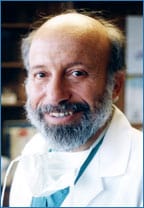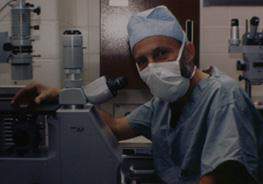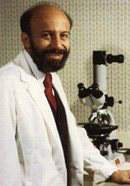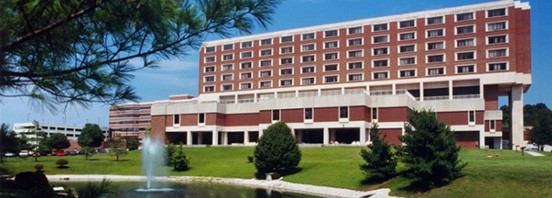LIFESTYLES MAGAZINE
Pre-Spring 1999, vol. 27, no. 160
Download a PDF version of this article.
The Physician’s Prayer
Maimonides 1135 .1204 C.E.
“Almighty God
Before I begin in my holy labor
To heal the work of Your hands
I place my supplication
Before Your awesome majesty.”

You’ve heard of JTS-Jewish Standard Time? Jewish events have a way of starting somewhat beyond their scheduled times; Jewish people have a way of stretching out hellos and goodbyes and ignoring the predetermined agenda. Some of us joke about it; some of us live it. But the reason Dr. Sherman Silber kept me waiting for 20 minutes before inviting me in to conduct the interview was quite literally–by his own admission–“Talmudic thinking”. What does this world-renowned infertility specialist mean by “Talmudic thinking”?
It’s a long story.
“In the Talmud, one of the classic first tractates that anybody studies is how you can be certain that there’s no leavened bread in the house on Passover,” Silber begins. “The passage asks how you can know that even though you’ve cleaned all of the chametz out of your house, a weasel hasn’t come in and brought in a crumb. It’s kind of funny right? This silly little detail?”
I nod.
“So the Gemara goes into this whole set of arguments back and forth–different rabbis of different generations. On the one hand, it’s a sin to have bread in your house on Passover; on the other, can God expect you to know whether or not a weasel came in?”
I don’t know; I hope Silber will tell me. But he isn’t interested in that question.
“It’s a stupid detail of life that couldn’t possibly have any bearing on the greater truths–but it does. The Gemara goes on for pages, and it expands from this little thing, by declension, into the universal question of how do we know what we know? And that section of the Talmud is one of the most brilliant exegeses in all of philosophy–about the difficult epistemological question of how we know what we know.”
That’s “Talmudic thinking”, expanding a seemingly irrelevant detail into a large question about the nature of truth and knowledge. Before inviting me into his office, Silber ended up explaining another epistemological issue: how he knew one of his patients was pregnant before testing her because one of his secretaries had asked him a question about the patient’s dry tongue and reduced urine output. That’s why he was late.
Sherman Silber grew up in a tough neighborhood on 66th and Blackstoneon the south side of Chicago, Illinois. His parents were not observant, but his mother insisted that he get a Jewish education–seven days a week. Every day after school he rode a city bus to a conservative shul for Hebrew school; on Saturday he attended services, and on Sunday he accepted the bagels and lox that were offered as compensation for his attendance at special programs.
Silber believes he can trace his success in medicine to the education he got at Hebrew school. “There are a lot of funny things going on in medicine, and particularly in this field,” he says. “But everybody knows that I have 100% integrity–not only in terms of honesty, but in terms of absolute dedication, not only doing everything for a patient but also doing the research. I do much more than anybody pays me to do to make sure we’re on the leading edge. And I believe that came from being in Hebrew school seven days a week and being exposed to the Jewish ethic.”
Silber didn’t always want to be a doctor. As an undergraduate at the University of Michigan, he majored in English. He was very interested in writing and literature–he won an award for his short stories and essays–but his parents had different plans for him.
“When I was 5 years old, my mother and father both let me know that they wanted me to be a doctor. You know the Jewish mother’s position on abortion?” Silber chuckles. “The Jewish mother’s position on abortion is that the fetus does not become a person until it has graduated from medical school.”
Though he gave in to his parents’ wishes, Silber never abandoned the humanistic foundation of his education. While in medical school, he served as a teaching assistant for the undergraduate introductory Shakespeare course. To this day he maintains that a background in the humanities can benefit a scientist tremendously.
“If you understand the great thinkers concerned with the human condition, if you have a feeling for that, that background will make you a better doctor. And as a scientist, it will help you to ask the more important questions.”

After graduating from the University of Michigan’s medical school and interning in cardiac surgery at Stanford, Silber spent a couple of years working in the Public Health Service in Alaska. The Public Service Hospital there needed a urology specialist, so despite his lack of training in that area, Silber filled the void. One of his patients was an 84-year old Inuit wolf hunter named “Arctic Johnny” who complained of a prostate problem: He had to urinate nearly every hour, and it was interfering with his hunting livelihood. In a short time, Silber had become quite proficient at fixing prostates, and he cured Arctic Johnny.
“He was the happiest guy in the world,” Silber smiles, remembering. “He continued to successfully hunt wolves for four years after that.”
Silber returned to the University of Michigan to study urology, but his experience there couldn’t compare to the exotic thrill of helping Inuits and Aleuts in Alaska. He needed a greater challenge, so he decided to specialize in renal transplantation, with a subspecialty in kidney transplantation. As he had always been interested in research, he began to conduct microsurgical experiments in the animal lab.
“I actually became well known among a small group in the research community for developing methods of kidney, heart and liver transplantation in rats,” he says. “My wife’s parents teased me all the time. ‘What are you doing operating on rats?’ they said. ‘Rats don’t have insurance.'”
His microsurgical expertise in rodents landed him a coveted job at the University of Melbourne-Royal Medicine Hospital in Australia. While there, some of the transplantation techniques that Silber developed in the lab later became important tools in the investigation of transplant rejection. It was Silber who began giving donor antigens and donor-strain blood to the recipient at various intervals prior to the transplant. This practice helps develop a specific immnuosuppression so that the recipients immune system won’t attack the new organ.

“This is the way Talmudic thinking goes,” Silber explains. “I think, ‘Well, if I can put a rats renal artery, which is a half-millimeter in size and invisible to the naked eye, back together, I should be able to reconnect a vas. So just for fun I figured I’d try a vasectomy reversal.”
What Silber attempted “just for fun” had a determining influence on his career. In 1975, he performed a demonstration operation for the American College of Surgeons–the biggest medical meeting in the world–with 20,000 surgeons watching on closed-circuit television. Silber thought his operationwas interesting, but largely irrelevant: “Who cares?” he asked himself. ” Who would want to have their vasectomy reversed?”
As it turned out, a whole lot of people.
On Oct. 15, 1975, the story made the front page of The New York Times–“Vasectomy Now Reversible With Microsurgery”–and news of the operation was picked up by the Associated Press. Nearly every paper in the country had an article announcing that vasectomies were reversible.
“I’m the guy who developed that procedure,” Silber says, still somewhat incredulous. “I never dreamed it would be so popular.”
More than 20 years and 4,000 vasectomy reversals later, Silber has refined the operation to such an extent that, along with several other surgical techniques he has developed for extracting sperm, he has essentially solved the problem of male infertility. Patients from all over the world fly to St. Louis to avail themselves of Dr. Silber’s care–doctors, professors, rock stars, astronauts, movie stars, rabbis, sheiks and kings among them. His 1979 book, How To Get Pregnant–written for the layman–was a bestseller, as was his 1991 book How To Get Pregnant With the Now Technology (a new edition was just published this year). He appeared on The Phil Donahue Show seven times, more than any other guest. In 1991, he served as a consultant to The Joan Rivers Show, appearing nearly 20 times to counsel infertile couples. He has also appeared onGood Morning America, The Today Show, NBC News, ABC World News, Charlie Rose and Nightline.
Silber can be credited with bringing the problem of infertility–which he refers to as an “epidemic”–to the attention of the public.
“Fifteen percent of all couples in the world are infertile,” be explains. “Twenty-five percent of women in their 30s are infertile. Most couples are putting off trying to have a baby until they’re in their 30s, and when they stop taking their birth control pills or take out the IUD, they’re going to find out that they can’t have kids without medical help.”
Along with developing and refining vasectomy reversal, Silber performed the first tubal ligation reversal in the United States. He also performed the first testicle and ovary transplantations in this country. Most recently, he has developed a method for injecting a single sperm into a single egg called ICSI (intracytoplasmic sperm injection). No matter how low a man’s sperm count, ICSI can ensure a normal pregnancy by removing an individual sperm from semen and injecting it into the woman’s egg. TESE–testicular sperm extraction–goes beyond ICSI to serve men with a zero sperm count. Using microsurgery, Silber can go into a man’s testicles and extract individual sperm, which is then injected into the egg. Normal pregnancy ensues.

Silber’s devotion to Judaism–his Talmudic thinking, his Jewish ethics–is further conveyed in his attitude toward his fertility work. It is Silber’s job to facilitate pregnancy and reproduction, and he understands that insofar as God’s commandment to be fruitful and multiply is a holy act, he considers his work sacred.
“The first commandment is to be fruitful and multiply, and it’s also a basic human need that has to be fulfilled. We’re obligated to do anything we can to help fulfill that commandment, short of breaking another commandment.”
As there is no Jewish injunction against manipulation of the sperm and egg to facilitate reproduction, Silber operates well within the bounds of Halacha. And operating within the bounds of Halacha is important to him Though not strictly Orthodox himself, he is very sympathetic towards Jewish Orthodoxy, and he and his wife regularly study at Aish Hatorah. In fact, his wife, though a dedicated Reform Jew, is on Aish Hatorah’s Board of Directors. The Silbers’ oldest son, who is Orthodox, is married and currently studying Talmud in Jerusalem.
But Silber remains open to all kinds of choices. His second-born son is a member of the United States Marine Corps’ Special Forces; his youngest son, now a freshman at Stanford, is also free to choose his own path. Though he is a world-renowned physician, a surgical pioneer and the leading specialist in his field, Silber does not insist that his way is the only way. And though Rambam’s Physician’s Prayer (translated by his son) is hanging in Silber’s waiting room, where he might consult it on occasion, he does not seem to need to. It appears that Silber holds the rabbi’s words in his heart, carrying them with him as he does his work. It may be Talmudic thinking that catapulted Silber to the top of his field, but it must be his gentle heart that’s made him such a successful human being.

